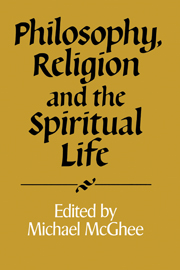Book contents
- Frontmatter
- Contents
- Introduction
- Philosophy and Religion in the Thought of Kierkegaard
- De Consolatione Philosophiae
- The real or the Real? Chardin or Rothko?
- Love and Attention
- Descartes' Debt to Augustine
- Visions of the Self in Late Medieval Christianity: Some Cross-Disciplinary Reflections
- Refined and Crass Supernaturalism
- Religious Imagination
- Moral Values as Religious Absolutes
- Revealing the Scapegoat Mechanism: Christianity after Girard
- Philosophy vs. Mysticism: an Islamic Controversy
- Non-Conceptuality, Critical Reasoning and Religious Experience: Some Tibetan Buddhist Discussions
- ‘Know Thyself’: What Kind of an Injunction?
- Facing Truths: Ethics and the Spiritual Life
- Notes on Contributors
- Index
Descartes' Debt to Augustine
Published online by Cambridge University Press: 04 August 2010
- Frontmatter
- Contents
- Introduction
- Philosophy and Religion in the Thought of Kierkegaard
- De Consolatione Philosophiae
- The real or the Real? Chardin or Rothko?
- Love and Attention
- Descartes' Debt to Augustine
- Visions of the Self in Late Medieval Christianity: Some Cross-Disciplinary Reflections
- Refined and Crass Supernaturalism
- Religious Imagination
- Moral Values as Religious Absolutes
- Revealing the Scapegoat Mechanism: Christianity after Girard
- Philosophy vs. Mysticism: an Islamic Controversy
- Non-Conceptuality, Critical Reasoning and Religious Experience: Some Tibetan Buddhist Discussions
- ‘Know Thyself’: What Kind of an Injunction?
- Facing Truths: Ethics and the Spiritual Life
- Notes on Contributors
- Index
Summary
More than Cartesian Scepticism
Jonathan Edwards identified the central act of faith as ‘the cordial consent of beings to Being in general’, which is to say to God (see Holbrook, 1973, pp. 102ff). That equation, of Being, Truth and God, is rarely taken seriously in analytical circles. My argument will be that this is to neglect the real context of a great deal of past philosophy, particularly the very Cartesian arguments from which so many undergraduate courses begin. All too many students issue from such courses immunized against enthusiasm, in the conceit that they have answers to all the old conundrums, which were in any case no more than verbal trickery. ‘By uttering the right words but failing to use them in propria persona, philosophy induces a kind of soporific amnesia bewitching us into forgetting our God-given task. That task is, of course, to do what Socrates did and to live as he lived’ (Burrell, 1972, p. 4). Burrell's words are not wholly fair to academic philosophers, nor to the Lady Philosophy. Plenty of philosophers really mind about the truth, and want to be Socratic in pursuit of it. But the danger is a real one. If all that matters is debunking past philosophers, how does that differ from the repeated refutation of the Chaldaean Oracles or the Prophecies of Nostradamus? A pretty enough pastime for the young, but hardly serious business for adults (as Callicles remarks: Plato, Gorgias 484 c 5ff).
- Type
- Chapter
- Information
- Philosophy, Religion and the Spiritual Life , pp. 73 - 88Publisher: Cambridge University PressPrint publication year: 1992
- 2
- Cited by

